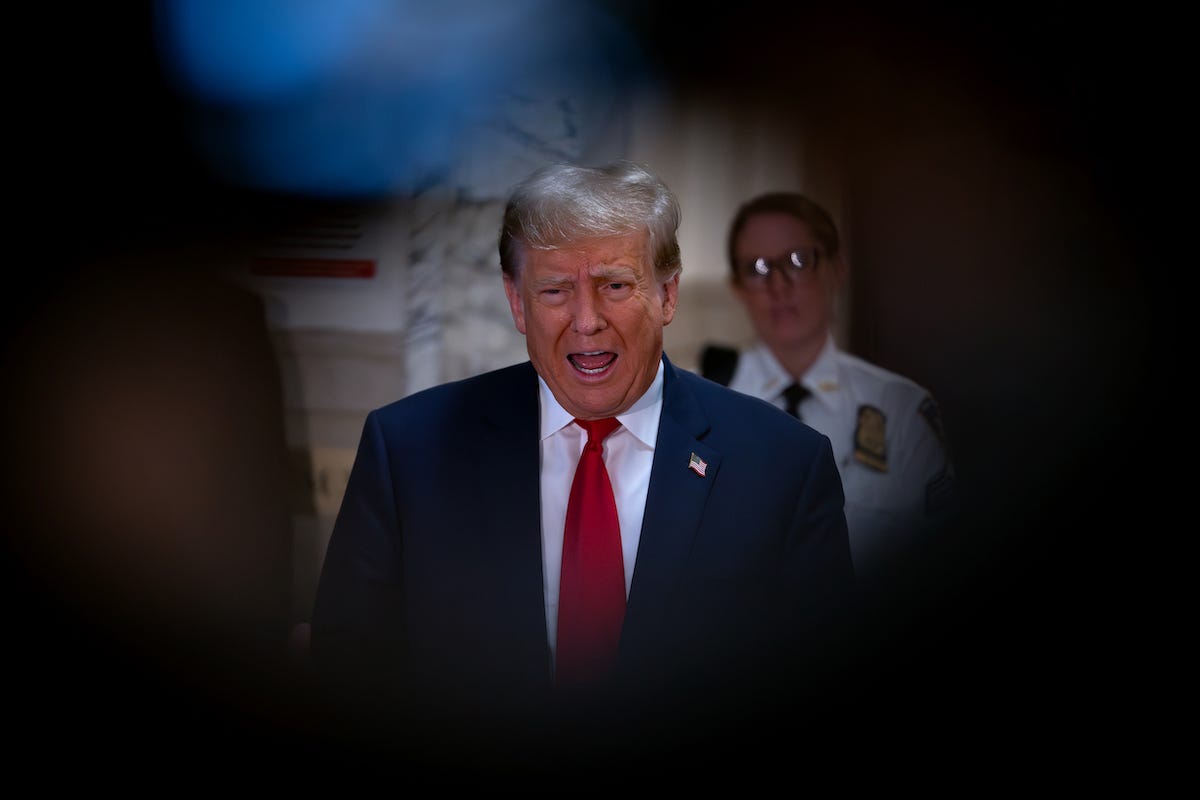Judges Are Clearly Terrified To Subject Donald Trump To The Rule Of Law
A ruling out of Colorado augurs poorly for those who think he should face justice like any other indicted criminal
For a brief but glorious moment after a federal grand jury indicted him for conspiring to overturn the 2020 election, it seemed like Donald Trump might actually be tried, convicted, and imprisoned before the 2024 election, if not before he locked down the GOP presidential nomination.
I no longer think that’s very likely, and the reason has nothing to do with tricks Trump has up his sleeve or deficiencies in the Justice Department’s case. It has everything to do with the timidity and irresolution of the judiciary.
That includes Tanya Chutkan, the federal district court judge presiding over the January 6 case, of course. But it was a late-Friday ruling by a judge in Colorado that forced me to terms with how successfully Trump is imposing his will on all the judges who aren’t already his partisan allies.
In a case contesting Trump’s eligibility for the office as an architect of the January 6 insurrection, Judge Sarah Wallace ruled that Trump did indeed “engage in insurrection,” as proscribed in the Constitution, but is nevertheless eligible to seek and claim the presidency once again. Section three of the 14th amendment forbids former officeholders from “hold[ing] any office, civil or military, under the United States” if they’ve “engaged in insurrection.” But Wallace ruled, in essence, that a loophole in section three makes it applicable to every federal office except the presidency and vice presidency. Either the framers of the amendment didn’t mean to include “the presidency” as an “office…under the United States,” or they omitted it by accident. Whoopsy!
This finding will come as a huge surprise to, for instance, the Department of Justice, which even under Donald Trump interpreted the Constitution’s invocations of “offices” of the United States to include the presidency. But no matter, because Wallace further implied that section three wouldn’t apply to Trump in any case: it only applies, she concluded, to officers who previously pledged to “support the Constitution,” whereas Trump’s presidential oath—the only one he’s ever taken—obligated him to merely “preserve, protect, and defend the Constitution.” What’s a synonym, again? Ah, who can say!
As fodder in the spin wars, her ruling has a little something for everyone. Trump supporters can rightly note that Wallace rejected arguments (like mine!) that their guy is ineligible for the presidency; Trump critics can respond that, after trying the issue, she found Trump indeed engaged in the insurrection, even though he was not among the rioters at the Capitol that day.
I think Trump’s critics have more to celebrate here than his supporters. Wallace’s reading of the 14th amendment is appealable, as Colorado’s secretary of state teased, but the appeals court isn’t likely to dismiss her factual finding that Trump is an insurrectionist. The essential question before appeals court would be: Given that Trump engaged in insurrection, does the Constitution bar him from the presidency? If the appeals court disagrees with the strained notion that the presidency is not an “office…under the United States,” Trump could still lose his place on the ballot in Colorado anyhow.
But it’s plain as day that Wallace went to great lengths to avoid applying the anti-insurrection clause to Trump. She practically admitted as much in her penultimate paragraph: Since there was a (tortured) way to construe the 14th amendment that exempted Trump, she felt compelled to adopt it.
This has become something of a pattern.
The judiciary is essentially split between judges, like Aileen Cannon, who are thrilled to protect Trump from the rule of law, and more impartial jurists who are scared to apply it to him. The latter behave as though holding Trump to a more lenient set of rules is worth it to avoid some civil strife they’ve conjured in their minds, or the death threats they know will follow any significant adverse rulings. I suspect these kinds of considerations influenced Judge Wallace. They also seem to influence Arthur Engoron, the New York judge in Trump’s civil-fraud case who barks loudly over Trump’s flagrant contempt of court, but can never bring himself to bite.
Same with Chutkan, who early on signaled she’d be reluctant to jail Trump for violating the terms of his bond, and would only deter him with the threat of a speedier trial. “The more a party makes inflammatory statements about this case which could taint the jury pool,” she stated, “the greater the urgency will be that we proceed to trial quickly.”
Now imagine it’s early-mid 2024 and a Washington, DC, jury has found Donald Trump guilty of conspiring to overturn the 2020 election.


